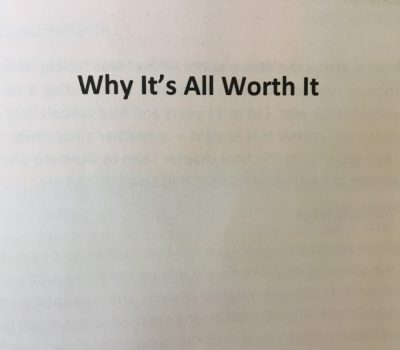


Our team sorts through all blog submissions to place them in the categories they fit the most - meaning it's never been simpler to gain advice and new knowledge for topics most important for you. This is why we have created this straight-forward guide to help you navigate our system.


And there you have it! Now your collection of blogs are catered to your chosen topics and are ready for you to explore. Plus, if you frequently return to the same categories you can bookmark your current URL and we will save your choices on return. Happy Reading!
Time- we never seem to have enough but Janelle blogs about how it is vital to schedule some time aside for intentional reflection.

Personal and professional growth comes in many forms. I’m a big believer in the necessity of continuous learning in order to be effective and successful. The best part? This learning can occur anywhere and everywhere through reflective practice.
Some reflection happens in the moment, but the deepest learning takes place when we schedule time for intentional reflection. I first started scheduling time for reflection seven years ago. It was a weekly appointment on my calendar, set aside for me to think about the work I had done, was doing, and wanted to do. It was a way to study my own experiences in order to improve my performance and the way I was able to serve others.
This practice is what led to the creation of my blog. I had just left the classroom to become the curriculum director for my district. Since I was new to the administrative team, and the only member of the curriculum department, I found it most effective to reflect on my own. I process my thoughts best through writing anyway but had never been a very committed journaler prior to this time. It was only through scheduling an actual appointment for myself on my calendar that I started to make it a priority.
Andy Gillett wrote, “The purpose of reflective writing is to help you learn from a particular practical experience. It will help you to make connections between what you are taught in theory and what you need to do in practice. You reflect so that you can learn.” This has proven true in my own practice. Regular reflection ensures that I don’t become stagnant in my practice. Writing out my thoughts forces me to slow down and really process what I’ve been thinking and doing.
Jerry Grauman of ROBO 3D agrees with the benefits of journaling for reflection. He says, “It focuses the mind when you have to commit your words to paper and sometimes profound thoughts come right out onto the page.” This is the key to reflective practice. All it takes is some focused attention, brain power and a willingness to learn. We often hear this referred to as having growth mindset, but this willingness to learn, change, and grow is centered around reflective practice. Intentional reflection is a top leadership practice regardless of your title.

Some people need a bit more guidance, especially when first beginning intentional reflection. If free-writing is uncomfortable, check out some different reflection cycles for help. I like the Gibb’s Reflective Learning Cycle because it offers come guiding questions as starting points.
Another more basic learning cycle consists of Planning, Acting, Observing, and Reflecting. I believe the reflecting portion is the most critical phase of any learning cycle. When we are willing to set aside time (preferably weekly) for true introspection, our performance will only improve. Scheduled reflection leads to a more natural and ongoing metacognitive process throughout every stage of learning, leading to greater effectiveness in all areas. Do you have a favorite reflective process? I’d love to hear about it.

The author

Read more

Read more

Read more

Read more

Read more

Read more

Read more

Read more


Are you looking for solutions? Let us help fund them! Nexus Education is a community of over 11,000 schools that come together to share best practise, ideas and CPD via online channels and free to attend events. Nexus also offers funding to all school groups in the UK via nexus-education.com


Established in 2011, One Education is a company at the heart of the education world, supporting over 600 schools and academies. Our unique appeal as a provider is in the breadth and synergy of the services we offer, supporting school leaders, teachers and support staff to achieve the best possible outcomes for their pupils and staff.

School Space is a social enterprise that has empowered schools for over 12 years through their profitable and hassle-free lettings services. So far, they’ve generated over £5 million in revenue for education, helping to connect over 200 schools with their local communities.


Unify is an online sales and marketing tool that allows users to create tailored personalised documents in moments.


There’s nothing special about the energy we sell. In fact, it’s exactly the same energy as all our competitors provide. But there is something special about the way we do it. Where others complicate the process, we simplify it. Where others confuse customers with hidden terms, we’re an open book. And where others do all they can to make as much money from their customers as possible, we do all we can to make as little. Everything we do, we do it differently. Our customers are a privilege. One we’ll never take advantage of.


Securus provide market-leading monitoring solutions to safeguard students on ALL devices both online and offline. We also offer a full monitoring service, where we carry out the monitoring on behalf of the school, freeing up valuable staff resources. From the smallest school to large MAT groups, Securus offers safeguarding protection for all!


Bodet Time offers dedicated solutions to education through lockdown alerts, class change systems, PA and synchronised clock systems. Improving time efficiency of the working and school day; ensuring safety through lockdown alerts; increasing communication with customised broadcast alerts.


Robotical makes Marty the Robot - a walking, dancing coding robot that makes programming fun and engaging for learners as young as 5. Our robots come with a full Learning Platform that has complete teaching resources, to make lesson planning a breeze.